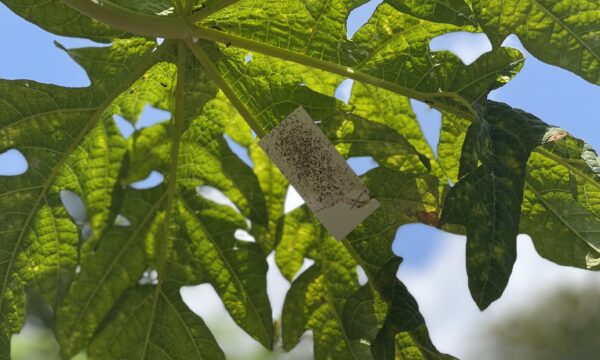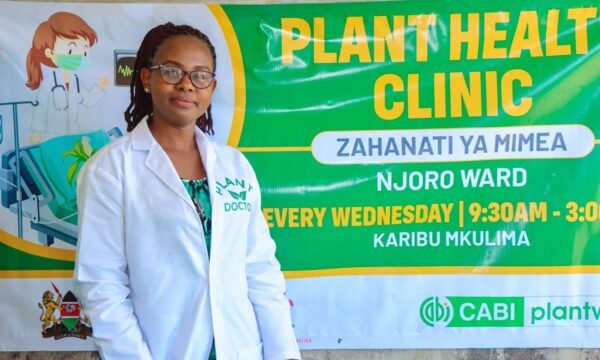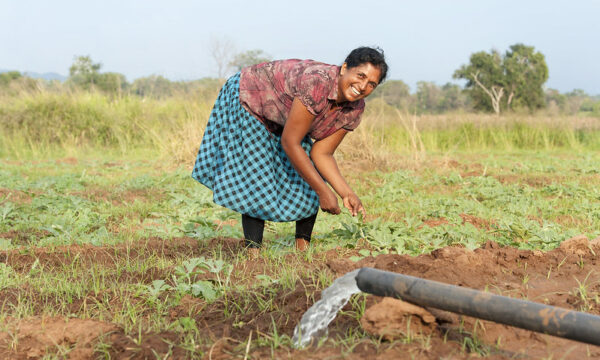Claire Beverley from the Plantwise knowledge bank has been visiting Kenya, find out what she has been up to in her latest blog post!
———————————————————————————————————————————————————-

Holding the banner for a new plant health clinic,
Credit: Claire Beverley ©CABI
I imagine there are few sights as breath-taking as the Rift Valley, so on Thursday I was pleased that we stopped for a few minutes on our way to Nakuru. I’m certain I joined the many tourists before me who have stopped at the same vantage point to take a photo or two, but, I’m not in Kenya to be a tourist. Instead my remit is to talk to plant health clinic doctors, based in various locations, about the challenges they face and the development of the Plantwise initiative. That’s exactly what I’ve been doing over the past week, making for a very productive and interesting introduction to Kenya.
Our journey started on 20 February as we set off from Nairobi, the site of one of CABI’s regional centres, and headed for the district of Mukurweini. Together with my colleagues, Peter Karanja and Linda Amondi, I attended the second half of an intra-cluster meeting at the district headquarters of the Ministry of Agriculture, with plant doctors from Ichamara, Kiahungu and Giathugu. These meetings are intended to provide plant doctors from different locations in their district with an opportunity to share experiences and discuss matters that arise in their individual plant health clinics. By discussing the pests and diseases that they are seeing across the district and the methods of control that they are advising farmers to use, they are helping each other to provide consistent and effective solutions, in a supportive forum.

Peter hands over the Kenya factsheets to Beatrice for the new plant health clinic, Credit: Claire Beverley ©CABI
CABI’s presence at this meeting was to provide plant doctors with feedback on data collected from the plant clinics and demonstrate the future of data management. It also gave us an opportunity to give Beatrice Mbote (plant doctor) some factsheets for Kenya and photo sheets of common plant health problems, so that she can refer to them when running the new plant health clinic in Giathugu.
Linda, who is a student at Jomo Kenyatta University, undertaking her master’s project with CABI, has been taking a closer look at the data coming in from the plant health clinics. Plant doctors gather pest and disease information from the famers visiting their clinics and record it on ‘prescription and record sheets’. Based on this data, Linda was able to provide some pointers to the plant doctors about how to fill in the sheets effectively. The intention is to capture as much accurate information as possible, enabling the plant doctor coordinators to monitor the activities within their districts. Accurate data collection also means that the knowledge bank will be displaying the latest and most detailed information on the global distribution of pests and diseases.
My session was to demonstrate the new procedure for data capture. The current process is to fill in paper sheets at the plant health clinic, which are then collected by the coordinators so that they can transfer the data to a database, by hand. This is time consuming and reduces the amount of time available to the coordinators for analysing the data and using it to monitor clinic activities. They also face time constraints due to their usual activities for the ministry.
The starting point for the new procedure is an improved form, which can be scanned, within seconds, to capture the data automatically. Character recognition software is then used to capture the scanned output, providing a verification stage, before the data are automatically sent to a database. You can imagine the positive response that this received in Mukurweini, especially from the coordinator!

Claire talking to plant doctors about the new scanning technique ©CABI
Together with some furniture and a banner for the new clinic to be set up in Giathuga, we were also pleased to leave a scanner with Nancy Murage, the District Crops Officer for Mukurweini, and the plant doctor coordinator for this district.
Nancy is very positive about the Plantwise initiative, and when asked for a quote, she wrote:
“Plant doctor clinics have helped ease off the burden from the frontline extension staff of traversing the whole location to diagnose disease and pest problems because now farmers bring their diseased plant materials at a localized point, plant doctor clinics, as they seek help in other areas of crop husbandry”.
Nancy is one of several coordinators that we have met over the past few days, who are equally as positive about the initiative and we have taken part in numerous discussions about how to ensure challenges are met so that the plant health clinics achieve sustainability.
2 Comments
Leave a Reply
Related News & Blogs
How plant clinics are strengthening crop health services in Bangladesh
When the first-ever plant clinic in Bangladesh opened in Dhaka in 2013, it initially faced a lack of interest due to its novelty and limited awareness among farmers. However, it went on to expand, providing advice to over 17,000 farmers and led to the…
2 July 2025





Reblogged this on The African Farmer.
[…] works for Kenya Agricultural Research Institute (KARI) and is also the district coordinator for the clinic cluster in Embu West. She told us that cereals are very important in Embu West and during a cluster meeting […]